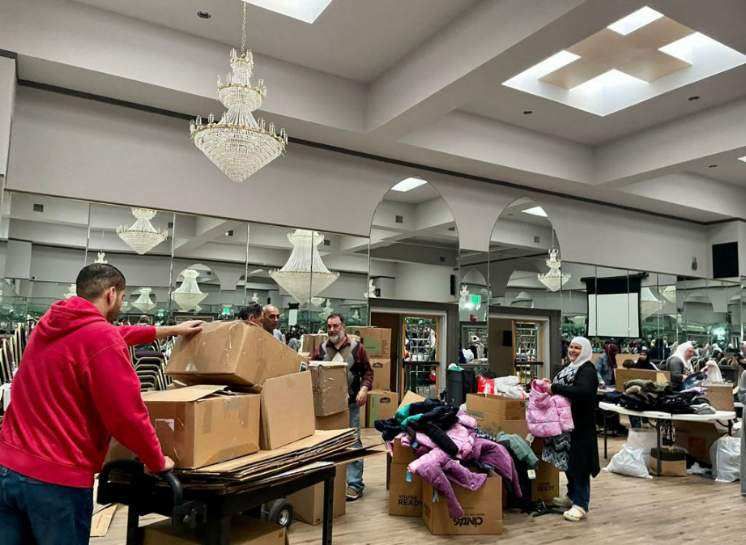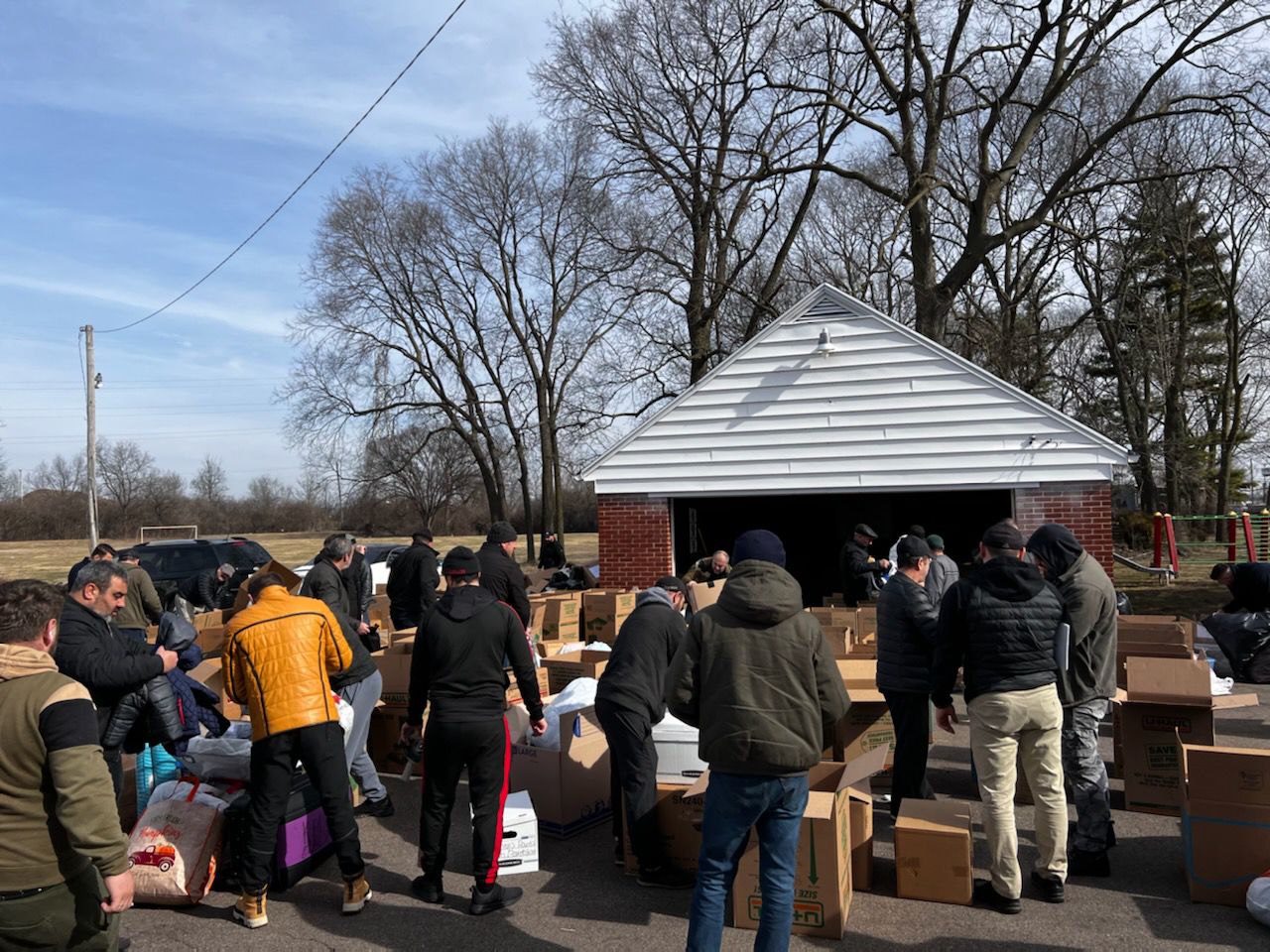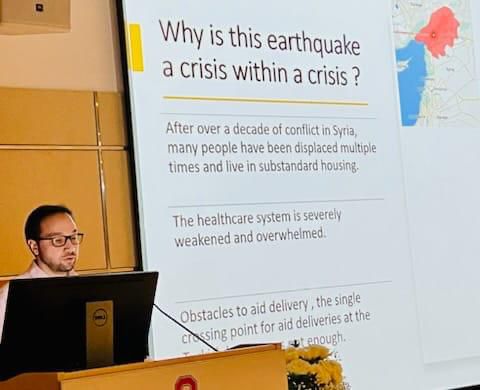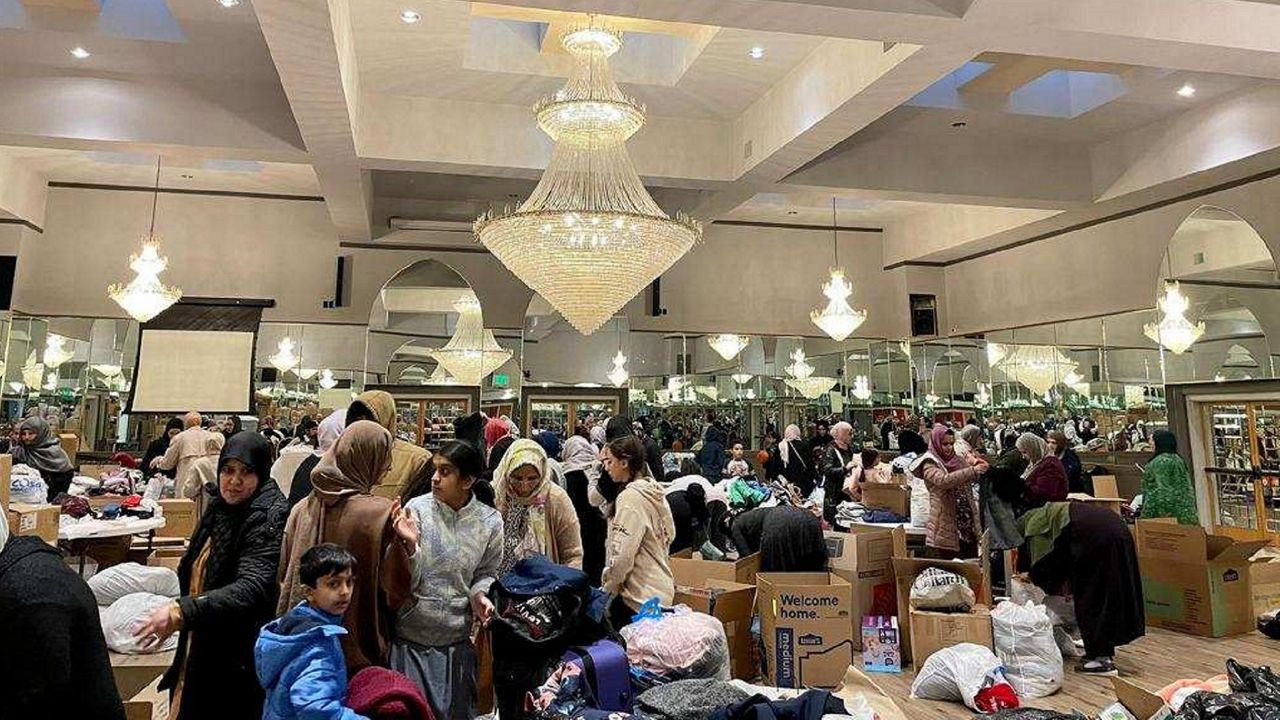CINCINNATI — Turkey’s Hatay Province is more than 5,900 miles from Cincinnati, Ohio, but for many in the Buckeye state, the recent earthquakes there hook much closer to home.
What You Need To Know
- Organizations across Ohio began gathering supplies and raising money shortly after the first devastating earthquake struck Turkey and Syria on Feb.
- More than 45,000 people died in the first earthquake, and other have been injured or killed in aftershocks over the past two weeks
- The Islamic Center of Greater Cincinnati held a two-day collective drive that led to six truck loads of goods and supplies
- Point 4 goes here
A magnitude 7.8 earthquake on Feb. 6 rocked parts of the Middle East, killing more than 45,000 people, according to the Associated Press. While most of the deaths were in Turkey, hundreds of thousands of others in that country and neighboring Syria were left in need of health care, food and temporary shelter.
On Monday, a new 6.4-magnitude earthquake centered in the Hatay town of Defne. That quake killed several people and injured more than 200 others in a part of Turkey left in rubble two weeks earlier, the AP reported. There were scores of injuries in Syria as well.
Soon after the first devastating quake, organizations across Ohio began raising money and collecting supplies — from non-perishable food to blankets and personal hygiene items — to ship overseas.
“I thought, ‘Allah (God) is great and we, as Muslims, always thank Allah for everything that happens,’ but the most important thing I saw was the immediate need to ease the suffering of people,” said Nema Hussein, a team leader for the Islamic Center of Greater Cincinnati. “We knew they were going through pain, and the only thing I was thinking of was how we can help ease their suffering.”
Hussein is a team leader for the center's Arzaq Team. (Arzaq means "provisions from Allah"). It’s a group of volunteers who organize in times of need to offer relief services, both in Ohio and around the world. During COVID-19, for example, the group administered supplies and set up home-care kits for patients to use during their quarantine. The kits went to local clinics.

Within two days of the first quake, the team organized a regional, two-day event at its space in West Chester. The Azraq Team set up at 8 a.m. on Feb. 8 in the center’s mirror hall, and by 10 a.m. they started receiving donations from residents, community groups, schools, churches and mosques, Hussein recalled.
They collected containers full of tents, clothing, medical supplies, diapers, generators and other essentials.
Two local food stores, Halal Market and Casablanca Halal, both in West Chester, offered to match 100% of non-perishable food purchased for the drive.
“So, anybody that was coming and saying, ‘Hey, we have a cash donation,’ we would send them immediately to these two locations,” Hussein said.
The group collected enough supplies to fill the inside of a 26-foot truck six times. They packed the goods into massive shipping containers and sent them to organizations in the region last week.
“It was truly amazing to see the community response,” Hussein said.
Like many others, Amina Barhumi, executive director of the Council on American-Islamic Relations (CAIR-Ohio), stressed that the “devastating” natural events led many Muslims around the world to act. She stressed that charitable giving and helping those in need are important aspects of Islamic life.
Muslim Americans give more to religious and non-religious charitable causes than non-Muslim Americans, a 2021 report from the Muslim Philanthropy Initiative at the Indiana University Lilly Family School of Philanthropy and Islamic Relief USA found.
“Part of our responsibility as Muslims is to mobilize and help those that are without a home,” Barhumi said.
No borders to helping those in need
A key partner in the Southwest Ohio donation drive was the Osman Gazi Masjid, a Turkish community center and mosque in Dayton, Ohio. It’s one of the member institutions of the Islamic Council of Dayton.
Over the years, the council of several mosques in the Dayton area mobilized to respond to events both stateside and abroad.
Following the deadly tornado outbreak in May 2019, a council-led team of more than 40 volunteers spent more than two weeks providing aid and shelter to those affected in Dayton, according to Mirza Mirza, a board member of Osman Gazi Masjid.

Those previous experiences helped them jump into action right away, he added.
“We were really shocked and nervous for those affected, but we didn’t panic or delay because we knew this situation was urgent,” Mirza said of learning about the earthquakes. “We started gathering up the information about whom to contact and who needed help, so we started making those connections.”
Mirza thanked the community for providing “great support” over the past few weeks. Donations came from mosques and Islamic faithful, he said, but there was a powerful show of support from the broader community as well. He listed places such as Dayton Children’s Hospital, Wright State University, even a local CrossFit gym.
Osman Gazi Masjid collected several shipments full of additional supplies as well as “at least a few hundred thousand dollars’’ that they’re sending to an aid organization in Turkey, Mirza said.
“Everyone came in right away asking, ‘What can I do? What do you need? You name it,’” Mirza said.
Right now, both the Islamic Center of Greater Cincinnati and Osman Gazi Masjid have stopped collecting donations, Mirza said, while they await follow-up information about what else might be needed.
But organizations, like the Syrian American Medical Society (SAMS), are continuing efforts to assist those injured in the round of earthquakes.
Adding to the devastation caused by the natural events is the fact northern Syria is full of refugees and people already displaced “multiple times” by a civil war that continues to rage forward 12 years after it started, said Dr. Nabil Alzaeim.
Alzaeim, a physician and clinical assistant professor of internal medicine at the Ohio State Wexner Medical Center, is from Syria. He said he still has family who live there. While he said he’s thankful none of his relatives died, Alzaeim emphasized they’re still affected by the earthquakes, especially in light of everything else that’s happened since 2011.
“They’re scared to death,” he added, noting that many of them fled from their homes following those, even those who live far away from the epicenter.

The AP reported that Monday’s earthquake was felt in Syria, Jordan, Cyprus, Israel and as far away as Egypt, and was followed by a 5.8-magnitude tremor.
Turkish authorities have recorded more than 6,000 aftershocks since the Feb. 6 earthquake, per the AP.
“They can’t sleep at night,” Alzaeim said of his family members. “They don’t feel safe because they know anything could still happen.”
Alzaeim feels grateful to have stayed in regular contact with them, but he stressed others haven’t been so lucky. To show support, he’s been a part of a range of community events in recent days. The first event was a fundraiser at the Noor Islamic Cultural Center in Columbus following the Friday congregational prayer. It raised more than $150,000.
Since then, they’ve partnered with several Syrian-owned restaurants and coffee shops in Columbus to raise money, either through donations or the businesses donating some proceeds from their sales.
The events offer established charities, such as SAMS, and other organizations where people can donate money or other items, Alzaeim added.
On Tuesday, Turkish and Syrian doctors held an awareness event at Wexner Medical Center. Beyond collecting money or raising awareness, the event let those from the local Turkish and Syrian communities discuss the impact on their families, Alzaeim said.
SAMS has worked for the past decade to create health systems and provide medical treatment to Syrian residents, those hardest hit in the northern part of the country. They’ve raised funds to support efforts in Syria, which includes a team of medical professionals, but they’ve also launched an earthquake-specific relief fund over the past few days.
So far, the SAMS Foundation donated $250,000 to a boots-on-the-ground organization, called Syrian Forum, to go toward everyday necessities, Alzaeim said.
The organization is still taking donations. As of Wednesday, the online fundraiser was approaching $2.1 million.
“This is our duty,” Alzaeim added. “I’d feel guilty living my normal life after seeing how many people are suffering. Spreading the word is my job right now.”



